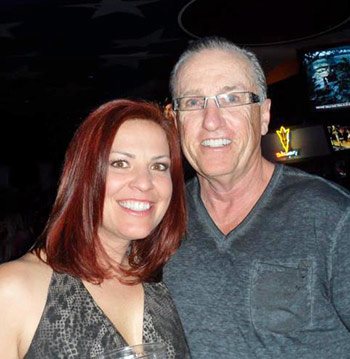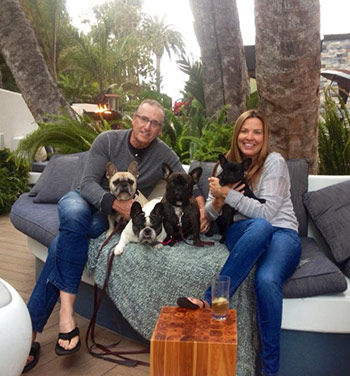In 2009, Tim Einwechter (BBA ’77) was finalizing the sale of his U.S. company, Ascent Healthcare Solutions, for $525 million. The entrepreneur and chartered accountant received a call from one of the company's small shareholders.
"He was wondering what his shares might be worth. He was hoping for $5,000, $10,000 or even $15,000," Einwechter says. "This was just after the 2008 financial crisis. He told me his home was in foreclosure, his business was faltering and he couldn’t make tuition payments for his kids’ college. So I pulled up my spreadsheet to see his shares and projected return. Then I said: 'Okay, hang on. I’ve got some pretty good news. I think your shares will be worth around $750,000.'"
Einwechter says he’ll never forget the man’s reaction.

"What we did with our business changed this guy’s life and his family’s life. He could keep his house. He could put his kids through school. It was pretty emotional for both of us."
In 2010, Einwechter was named Arizona’s "Private Company CFO of the Year." It’s an award presented to financial professionals "for outstanding performance in their roles as corporate financial stewards." But he wasn’t finished yet. After the sale of Ascent, Einwechter became an operating partner in 1315 Capital and a managing partner in Alliance Healthcare Partners. He also took on the role of CFO at Intralign Holdings and stayed on as CFO at Ascent/Stryker Sustainability Solutions. In 2015, with the non-compete clause included as part of his sale of Ascent expired, Einwechter and his business partner, Rick Ferreira, returned to the medical device field and launched Innovative Health Care.
Einwechter’s companies have created transformative cost efficiencies in the health-care business, including the use of new technology and repurposing, or reprocessing, of medical equipment.
"We built the medical device reprocessing industry in the United States," Einwechter says. "If you tell that to people who knew me when I was a kid back in New Dundee, they would say: 'That guy? That guy was successful?'"
Einwechter's father passed away when he was just nine years old. He went to live with his grandparents in New Dundee, just outside of Kitchener.
"I wasn’t much of a student," he recalls. "As long as I got my chores done, I could do what I wanted. I had a motorcycle by the time I was 16. No one ever asked me if my homework was done. I ended up failing Grade 9. Every single year, I had to go to summer school for math."
In Grade 13, after a friend mentioned he was going to Laurier to study business, Einwechter thought he might give it a try, too. He scraped together a 66 per cent average and was accepted into the BBA program, but quickly lost interest.
"I had no focus, no appreciation for the opportunity I had," Einwechter says. "I just stopped going to classes."
Einwechter took a job on the meat production line at Schneider’s.
"In those days, it was considered a good job. But after two years, I had a wake-up call. Some guy on the line didn’t show up. Word went around that he had died the night before. So there I was, a butcher on a production line, and I realized that I didn’t want to spend the rest of my life doing that. It was time to go back to school."
This time, Einwechter says, he was ready.
"I had grown up, married and matured. I wanted the degree and I wanted to become a chartered accountant. I wasn’t really sure what that meant, but I liked working with numbers and I liked business."

With encouragement from family members and night classes to make up his grades, Einwechter got back into the program. His younger brother, Dan, was in the BBA program at the same time.
"We were both working really hard," Einwechter says. "Dan was living at home while he was taking classes and starting up his trucking business. But I was married then and out on my own. I had a goal. I wanted to finish my last three years of classes in two years."
Again, Einwechter wasn't a typical student. One term he took eight courses while delivering pizzas at night. Another term he wrote three three-hour exams in one day.
"Laurier was great to me," he says. "They were prepared to work with me so I could I make my goal."
Einwechter also liked the structure of the program.
"The smaller classes and the case studies let me interact with the prof and the other students. I could ask whatever questions I wanted to ask. That’s how I liked to learn."
He has fond memories of accounting professor Howard Armitage, who taught him to have a real appreciation for the importance of accounting work. "And there was a statistics prof who sat cross-legged on his desk and just talked to us. He told stories. He actually made stats interesting."
When he was rewarded with good marks, Einwechter gained confidence. "I realized I could do this – and I was good at it," he says.
Einwechter’s first daughter was born just after his graduation in 1977. He was soon employed as a CA at a small firm, where his broad BBA studies helped him expand the scope of work he took on. "I had a lot of responsibility right off. It forced me to take on larger jobs than would be typical for a new CA."
That steep learning curve helped Einwechter take on his next challenge. During a trip to Phoenix with Rick Ferrier, he found his entrepreneurial streak.
"We thought we were going down for three months to help this small health-care company attract more investment. We loved the business model of what they wanted to do. But we saw right away that they didn’t have the revenue."
Einwechter and Ferrier took a chance, moved to Arizona and helped build Ascent into the $525-million company that changed the lives of so many employees and shareholders.
"We took on the challenge and we had to fight our way through every obstacle," Einwechter says. "Business, government, you name it. That’s what it took. But we persevered. We never gave up. At times our investors would refer to us as taking a hockey player approach to challenges – we never backed down from a fight."
Einwechter has words of advice for those setting out on an entrepreneurial path.
"The entire entrepreneurship program at Laurier is amazing," he says. "The case study approach was fantastic for me. It taught me how to assess and work through a challenge, instead of memorizing statistics or a set of facts just to pass an exam. I can say that Laurier’s case study approach has benefited me throughout my career."
Lazaridis School of Business and Economics programs and the new Lazaridis Hall building are great, Einwechter says, "just what we needed." But, he adds, it’s what happens after you get an education that matters.

"There are a lot of people who think they want to be an entrepreneur," he says. "They look at guys who are successful and they want to have that kind of car and that kind of house. But they don’t realize all the sweat and the hard work that it takes to get there.
"I’d like to ask them: ‘Are you ready to be paid last, after everybody else? Are you ready to go to bed worried and wake up worried because you know people are depending on you?’"
In the balance between being a responsible employer and needing to make a profit, Einwechter says he has some ground rules. "Business isn’t just about what you can do for yourself," he says. "It’s about what you can do for other people, especially when no one is looking."
Providing health care for his employees is one of those ground rules. "I’d rather shut the doors on the company than take health care away from them," he says.
Other advice to Laurier’s newest entrepreneurs? "Don’t be afraid to make a decision, to take a risk. Do the work and stand behind it. Even though you’re a CA, you don’t have to be a bean counter. Use your gut instincts. And if you believe in what you are doing, don’t worry about what other people think about it. Or think about you."
In other words, don’t be afraid to break the mould.
"The best compliment I ever receive is when someone says that I’m unlike any other CFO they know," Einwechter says "That’s my personal favourite."
An entrepreneurial streak runs strong in the Einwechter family. Tim’s brother, Dan Einwechter (BBA ’77), started a trucking business with one truck in 1975 during his second year in the BBA program.
Within 10 years, he had a fleet of 100 vehicles and was on his way toward owning more than 4,000, creating one of Canada’s largest privately owned trucking companies.
Today, Dan is chairman, CEO and majority owner of Challenger Motor Freight, a transportation company with revenue of approximately $300 million a year.
Dan has served on the dean’s advisory council for the Lazaridis School of Business and Economics, the president’s council of advisors and the campaign cabinet for the Building Canada’s Best Business School fundraising campaign.
Among his many industry and community awards, including recognition as leading one of Canada’s 50 best-managed companies, Dan was named Laurier’s Alumnus of the Year in 1996 and one of Laurier’s 100 Alumni of Achievement in 2011.